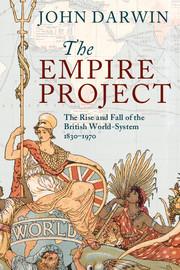Book contents
- Frontmatter
- Contents
- List of maps
- Preface and acknowledgments
- Introduction: the project of an Empire
- Part I Towards ‘The Sceptre of the World’: the elements of Empire in the long nineteenth century
- Part II ‘The great liner is sinking’: the British world-system in the age of war
- Conclusion
- Notes
- Select bibliography
- Index
Preface and acknowledgments
Published online by Cambridge University Press: 11 December 2009
- Frontmatter
- Contents
- List of maps
- Preface and acknowledgments
- Introduction: the project of an Empire
- Part I Towards ‘The Sceptre of the World’: the elements of Empire in the long nineteenth century
- Part II ‘The great liner is sinking’: the British world-system in the age of war
- Conclusion
- Notes
- Select bibliography
- Index
Summary
The British Empire, wrote Adam Smith in 1776, ‘has hitherto been not an empire, but the project of an empire; not a gold mine but the project of a gold mine’. A hundred years later, his condemnation might have softened. But, viewed as a political or administrative entity, British imperialism remained just such a project: unfinished, untidy, a mass of contradictions, aspirations and anomalies. Defined as the exercise of sovereign power, or the unfettered enjoyment of imperial rule (the criteria still favoured by many historians), the British Empire in its heyday was largely a sham. Over much that was most commercially or strategically valuable, it could claim no authority; over much that was useless, its hold was complete. Of the half-dozen states whose loyalty was most vital to British world power in 1914, only one could be given direct orders from London.
Partly for this reason, I have preferred the term ‘British world-system’ to the conventional ‘Empire’. The term was given authority by the shrewdest historian of modern British imperialism. It is also meant to convey (the real theme of the book) that British imperialism was a global phenomenon; that its fortunes were governed by global conditions; and that its power in the world derived rather less from the assertion of imperial authority than from the fusing together of several disparate elements. Amid the colossal expansion of scholarly work on the history of empire, it has been easy to lose sight of the geopolitical facts on which its cohesion depended.
- Type
- Chapter
- Information
- The Empire ProjectThe Rise and Fall of the British World-System, 1830–1970, pp. xi - xivPublisher: Cambridge University PressPrint publication year: 2009
- 1
- Cited by



